John U. Bacon is the author of multiple New York Times bestsellers about college football, including Three and Out, Fourth and Long, Endzone and Bo's Lasting Lessons (with Michigan coach Bo Schembechler). His latest, Overtime: Jim Harbaugh and the Michigan Wolverines at the Crossroads of College Football, will be released Sept. 3. This excerpt features parts of the chapter on recruiting, titled "Hard To Beat The Cheaters."
Boiled down, the recruiting process is simple: Figure out which players you want, then try to get them. But both steps require a few dozen sub-tasks each. If you want to do it Michigan's way, the first step is the most important -- and the most complicated.
During the 1985 season, Harbaugh's redshirt junior year at Michigan, he completed his journey from the outskirts of college football, where he almost went unnoticed, to center stage by leading the Wolverines to a number two final ranking.
That same fall, five hours away in Indianapolis, a high school senior quarterback named Jeff George was basking in all the recruiting attention Harbaugh never received. George won the first Gatorade National Player of the Year award, and the Dial Award as the national high school athlete of the year, in any sport.
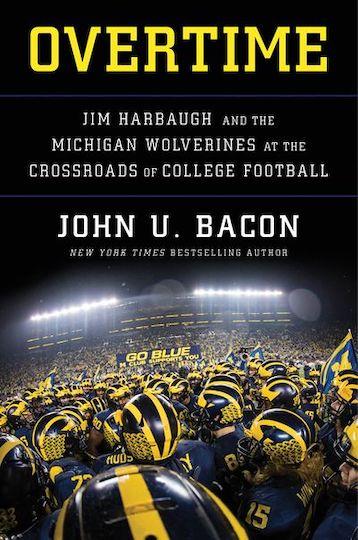 Dozens of coaches beat a trail to George's door, including Schembechler (who didn't name George in our book, but I will now). Thanks to the work of Harbaugh & Co. that season, Schembechler told me, "We thought we might have a shot at [George]. But when we got there, this kid was slumped in his chair, he didn't bother to get up to shake our hands, and he started barking at his mom to get him a pop or something -- and she ran to the kitchen to get it for him! Boy, that wasn't the way my mom did it! It didn't take long for me to realize this boy might have been blessed with a golden arm, but he was also cursed with a nickel head."
Dozens of coaches beat a trail to George's door, including Schembechler (who didn't name George in our book, but I will now). Thanks to the work of Harbaugh & Co. that season, Schembechler told me, "We thought we might have a shot at [George]. But when we got there, this kid was slumped in his chair, he didn't bother to get up to shake our hands, and he started barking at his mom to get him a pop or something -- and she ran to the kitchen to get it for him! Boy, that wasn't the way my mom did it! It didn't take long for me to realize this boy might have been blessed with a golden arm, but he was also cursed with a nickel head."
After just thirty minutes Schembechler had seen enough, nodded to his assistant coach, thanked the family for their time, "then got the hell out of there."
Jeff George went to nearby Purdue for his freshman year, but when the coach who had recruited him, Leon Burtnett, resigned, George transferred to Illinois. He put up great numbers but tended to alienate his coaches and teammates wherever he went. After the Indianapolis Colts picked him first overall in the 1990 draft and gave him a record contract, his four Colts teams compiled a 21-43 record before Harbaugh arrived the next year. For the rest of his 13-year career, George would get traded, tick off his new coaches and teammates, then get traded again. He often put up good numbers, but never came close to a Super Bowl.
Schembechler liked to point out George never won a Big Ten title, either, unlike "every quarterback we've ever had here at Michigan. That long list includes Jimmy Harbaugh. Jim ended up being twice as good, in my book, as the Golden Arm -- Harbaugh was the Big Ten MVP his senior year -- and Jim's teammates liked him. Maybe Harbaugh didn't have half the arm of the Golden Boy, but he had twice the brains and ten times the heart. Give me those specs, any day."
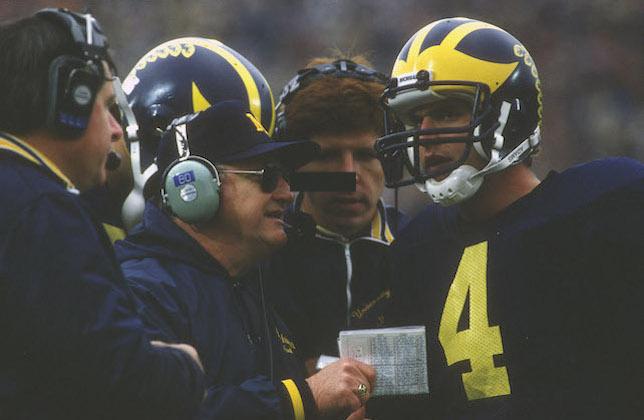
Harbaugh would remember that lesson.
"If you want to make Michigan great, and make yourself great, this is a great place to be," Harbaugh told me. "The ones you have to oversell what we have to offer, you know it's not going to work. If you don't get the appeal of this program, of a Michigan education, of the kind of camaraderie you get working with like-minded people -- well, I don't know what to tell you. You'll probably be happier somewhere else -- and maybe we will be too!"
Harbaugh also dislikes the specialization trend, preferring multisport athletes.
"We ask them, 'Why aren't you playing basketball or track or baseball?'" Harbaugh said. "‘Oh, our basketball team is horrible.' Great, then you can start! Or, ‘They're too good.' Great, then you can learn! Their attitude is, if they're not going pro at something, why do it? That's criminal."
Harbaugh cited some statistics off the top of his head: Of the first 32 players drafted by the NFL in 2018, 27 played at least two sports, and 23 played three.
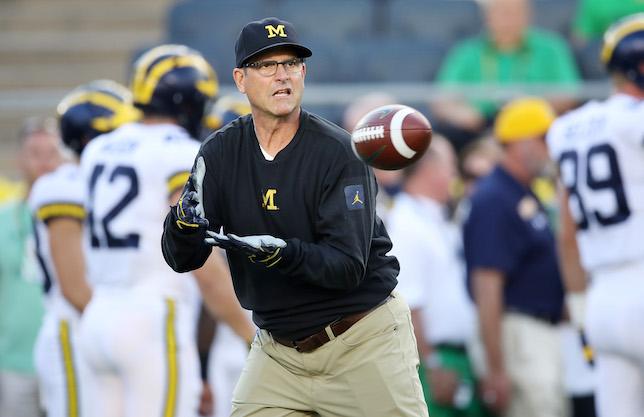
"I think the lesson is pretty obvious: athletes want to play. Competitors want to compete. Those are the guys we want."
Jim's dad Jack added, "When I hear someone say, 'I'm concentrating on football,' an alarm goes off. That might not be the guy you want."
"Playing football for Michigan is a tremendous gift you can give to yourself and your family," Jim told me. "Just picture the parents of all these players, boring the shit out of the neighbors, telling them, ‘Our son's going to Michigan, he's playing for the football team, he's working harder than he ever has, and he might even get into the game.' Bet they say that a lot. Look at the parents of Navy Seals, or West Pointers. Your kid's a Cadet at Army? That's a tremendous gift you can give your parents."
***
In addition to filtering for academics, chemistry, and character, Michigan drops anyone who hints about getting paid. The rampant cheating among some of college football's highest-ranked programs is the worst kept secret in college sports.
Years ago Schembechler taped a conversation with a high school coach asking for $5,000 for his player. Schembechler sent the tape to the NCAA, which promptly did nothing, which was exactly what Joe Paterno told Schembechler would happen.
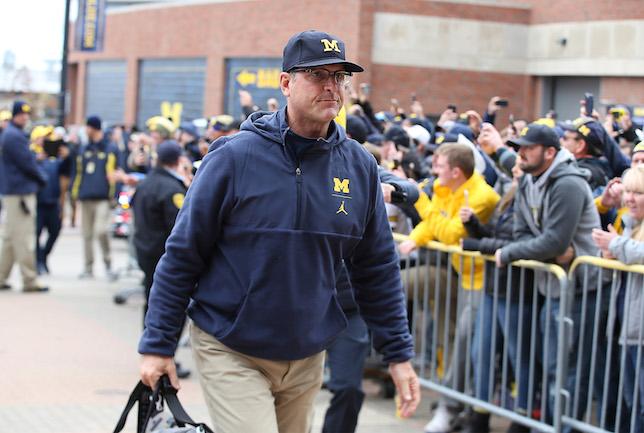
There is little evidence that the NCAA does any more these days. For an earlier book I spent almost every Wednesday night of the 2012 season talking with Louisiana native-turned-Penn State star Mike Mauti, who had turned down money from several Southern schools before accepting Penn State's offer of a scholarship, an education, and an opportunity -- nothing more.
"I know for a fact there are players getting paid [at other schools]," Mauti said. "Guys I know are getting tens of thousands of dollars a year. They give you credit cards until they run out. There's a lot of money involved. One hundred thousand dollars? Over the course of five years? Easily. I was offered money. They don't come out and say they're going to give you this money, but their players know the way things work, and they tell you. It's a different culture out there."
Mauti and I shared the stories we'd heard about coaches channeling money through churches, a practice that few Southern politicians or reporters would dare investigate; offering jobs to the parents in the city or county, not the school; giving recruits credit cards in someone else's name, or cases of casino chips to cash in; and two relatively new tricks, having a booster buy the family's home for far more than market value, and telling players to take their beat-up junkers into a Mercedes dealership, where they receive a high-end "loaner car" while they wait for a replacement part -- which could take years, it turns out.
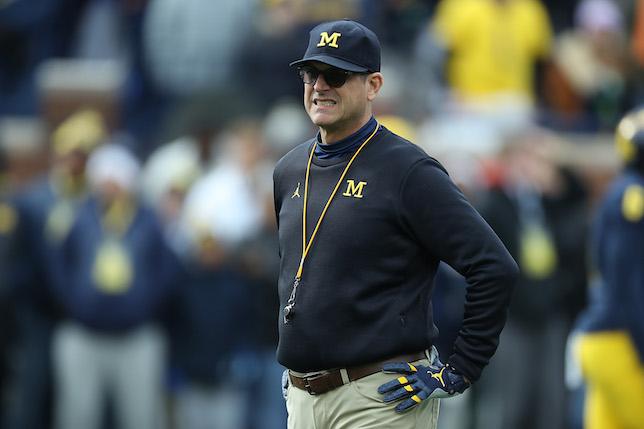
In this business you don't have to investigate the cheaters to find these stories. They wash up on your shore, unbidden. All the coaches, players, recruiting coordinators, and reporters know this stuff, without even trying. When Michigan's Lamar Woodley entered the Pittsburgh Steelers' locker room, still carrying his Nike bags and battered Velcro wallets from college, his new teammates laughed and asked why Michigan players didn't get Gucci bags, like they did?
After Mauti and I discussed these various schemes, he looked right at me and said, "Okay, I know what's going on. You know what's going on. How come the NCAA doesn't know what's going on?"
I didn't have a good answer, except the obvious: eleven NCAA executives make more than $450,000 a year, led by President Mark Emmert, who makes well over $2 million -- all for running a non-profit driven by amateur athletes. They've got a good thing going. Why rock the boat? Worst case scenario: they find a program that won a national title is guilty. Now what? Pulling down banners messes up the marketing plan.
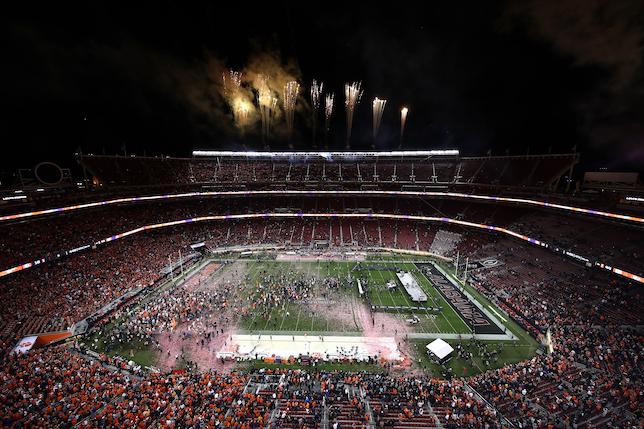
"They have to want to go after the cheaters," Mauti said. "It's not the public's job to determine that -- it's theirs. Otherwise, what's the NCAA for? What do they do?"
The media hasn't done much better. In fairness, reporters are hamstrung by journalistic ethics from publishing anything without sufficient proof, and that usually means eye-witnesses, on the record. As crime novelist Scott Turow once wrote about the law, "Hedged in by the formalities of the rules of evidence, our truth-finding system cuts off the corners on half of what is commonly known." So it is with journalism. There's a sizeable gap between knowing something and proving it.
Nonetheless, while the NCAA and the announcers who shill for the top coaches on national television see no evil, the national reporters and columnists tends to take the flip side of that cop-out by claiming that the entire enterprise and everyone in it is corrupt, and "amateur athletics" and "student-athlete" are just cynical oxymorons.
But that is equally lazy and almost as dishonest. It not only ignores the coaches and players who are doing it honestly, at considerable sacrifice, it also conveniently allows the reporters to avoid the uncomfortable business of actually investigating who's cheating and who isn't. They know if they do an honest job they will alienate the very coaches and players they need to interview for their articles, books, and radio and TV shows. So they play along, invariably praising this team or that team's new coach as "a great hire," and all backs get scratched. The show goes on.
As Harbaugh said to me, "Hard to beat the cheaters."
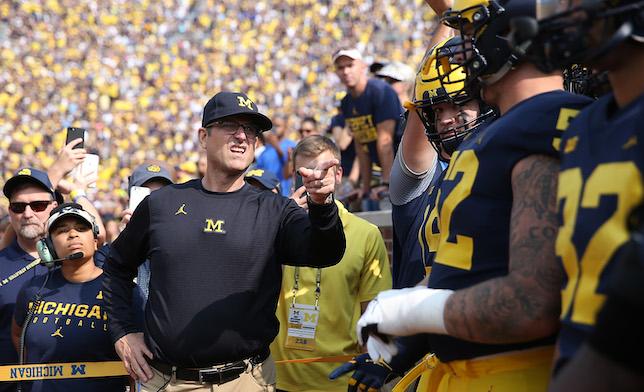
Where does that leave the coaches and players who aren't cheating? On the outside looking in, trying to do it the hard way, and getting no credit for it from the NCAA or the media. In this bizarre world where the guilty are praised and the innocent are punished, perhaps the biggest surprise is that some coaches still try to play by the rules anyway, and some players turn down illicit money to play for them. But how doubly delicious it is when an honest program actually beats the cheaters.
When I mentioned all this to Dudek, he shrugged. I was not telling him anything he didn't already know.
"You hear rumors," was all he said.
But he hears far more than that since Michigan and the programs that pay players occasionally battle for the same recruits, such as Rashan Gary. In this cynical age it's stunning that Michigan can win some of those recruiting wars, but generally only when the parents want something more lasting for their son than a hand-out.
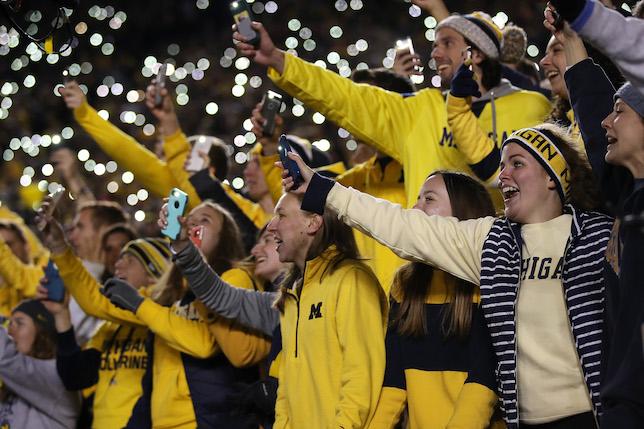
When Michigan was recruiting against a school that paid players a few years ago, Michigan's point man on the recruit, an assistant coach, returned from his trip dejected. He pulled down the recruit's magnet from the board and tossed it into the trash can.
"What happened?" a colleague asked.
"New car in his driveway," the assistant said. "We're not gonna get him."
It's also possible to "cheat legally." In 2015 the NCAA started allowing schools to pay student-athletes' "full cost of attendance," which includes travel, food, laundry, and other expenses not covered by scholarships which cover tuition, room, and board – a long overdue reform, praised by all sides of the equation.
Before the rule passed admissions departments had already been calculating the "full cost of attendance" to establish federal guidelines for all students. Michigan's admissions office reported that, for out-of-state students, the "full cost of attendance" averaged an additional $2,400 per term. After the NCAA rule passed, "because our school has integrity," Steve Connelly added, the figure remained the same.
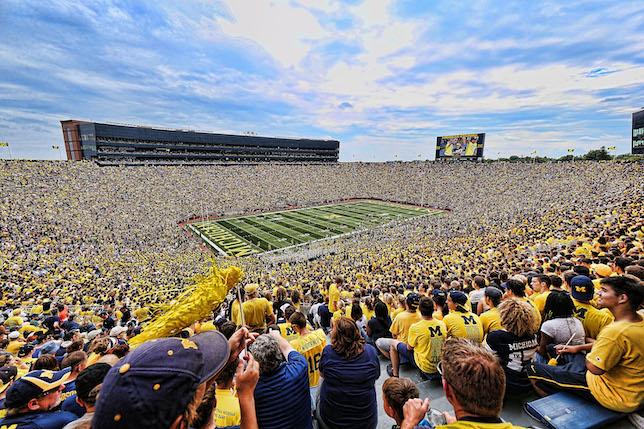
Meanwhile, in the Southeast Conference, once the NCAA passed this provision Alabama determined that their "full cost of attendance" for out-of-state students suddenly came to $5,386 -- or 34 percent more than they'd claimed the year before.
"You can't tell me," Connelly said, "that all of a sudden it became 34 percent more expensive to drive to Tuscaloosa."
But Alabama's figure wasn't even the highest. Auburn claimed a bigger jump to $5,586, while Tennessee calculated an additional $5,666 per term, the highest in the nation. Why it costs 136 percent more to travel to Knoxville than Ann Arbor is a mystery, especially when Michigan has far more students traveling from both coasts.
"You can't tell me it's a coincidence that all three schools experienced a sudden spike in the actual cost of attendance," Connelly added. "You're giving these programs another advantage over our recruiters. Basically, those schools can give their players $3,000 more per semester than we do. Is it legal cheating? You tell me."
"Look," Dudek said, "we know there are people who don't operate on the same moral plane that not only Michigan expects, but coach Harbaugh demands. So the last thing I'm doing is going down that rabbit hole -- probably be the fastest way to get fired around here.
"The good news is we so rarely go so far down a path with a guy whose character we're not sure about that we get to a point where the kid or his family asks for a bag of money. I've never had anyone directly ask me for anything. If they're going to do that, they probably don't consider us very long."
-- Excerpted by permission from Overtime: Jim Harbaugh and the Michigan Wolverines at the Crossroads of College Football by John U. Bacon. Copyright (c) 2019. Published by HarperCollins. All rights reserved. No part of this excerpt may be reproduced or reprinted without permission in writing from the publisher. Available for purchase from the publisher, Amazon, Barnes & Noble and Apple Books. Follow John U. Bacon on Twitter @Johnubacon.





